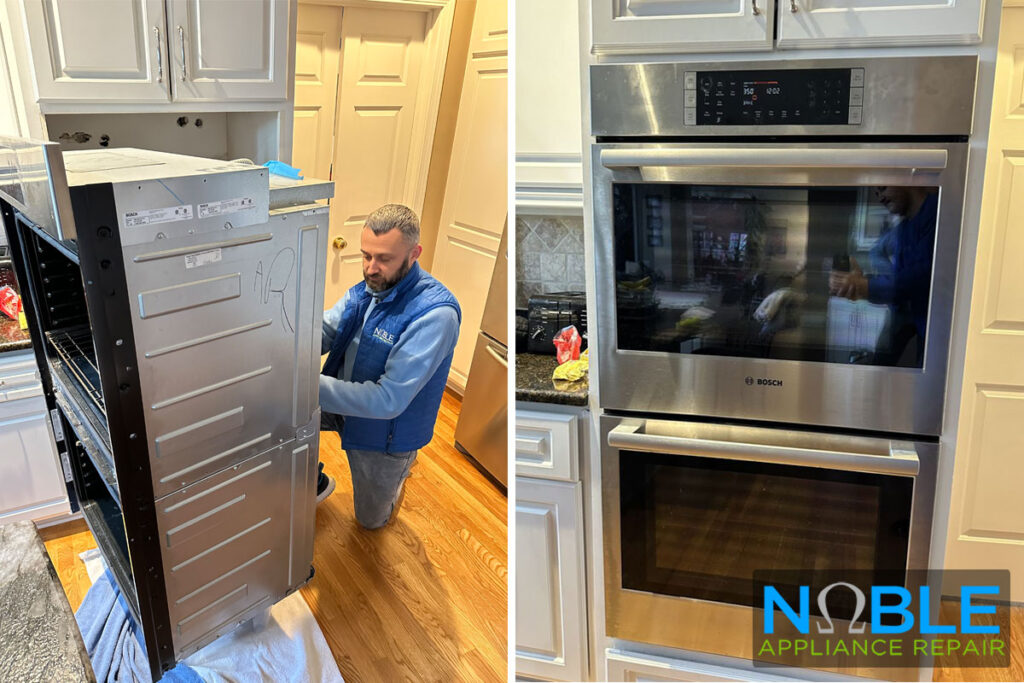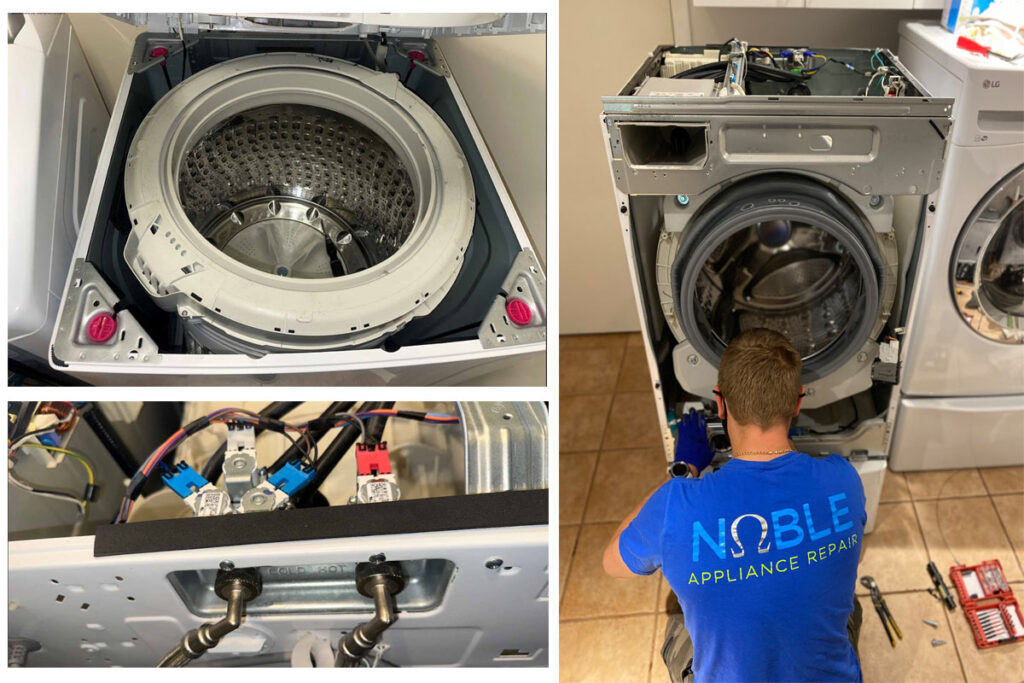Home | Blog | Replace or Repair Your Appliances: A Complete Guide to Making the Right Choice
Replace or Repair Your Appliances: A Complete Guide to Making the Right Choice
The question of whether you should repair or replace appliances boils down to a simple general rule: fix if repair costs under 50% of buying new, replace if over, with some exclusions applying. With proper repair methods and maintenance, most appliances can last 10-15 years after a successful repair. But it’s not always that easy.
The Dilemma of Repairing vs. Replacing Appliances
Each appliance repair situation needs a unique approach. A washing machine with worn bearings presents different challenges than a malfunctioning ice maker or a struggling dishwasher. Before deciding what to do with your home appliances—repair or replace—consider the following:
What You Need to Check Before Deciding
When choosing between repair or replacement for most major appliances, the appliance repair cost is only the starting point. A $300 repair may seem reasonable in the case of an expensive machine, but consider energy efficiency—new models can cut power bills by 20-40% saving way bigger amounts of money in the long run. Additionally, factor in the appliance’s average lifespan, age, warranty status, parts availability, seasonal price changes, repair history, and current market prices.
Review Your Appliance’s Current Condition
Your first step in the home appliances repair or replace decision starts with a detailed unit inspection. Consider how well your unit performed before this breakdown: strange noises, longer cycles, poor freezing, or higher energy bills often signal deeper problems. For older appliances beyond 75% of their expected lifespan, even small issues can signal bigger problems ahead. A history of recent repairs points to declining performance and may justify replacement.
Check the Warranty Status
Check your owner’s manual for warranty coverage before spending on a broken appliance repair. Many home appliance manufacturers offer extended warranties that can make repairs more cost-effective. Finding your warranty status takes minutes but can save hundreds in repair costs.
Consider the Age of Your Appliance
The age of a broken appliance often determines if repair makes sense. Modern fridges typically last up to 10 years, while dishwashers serve 5-10 years before major issues arise. For instance, if your existing dishwasher is past 8 years, consider a new energy-efficient model with new features—a new machine could cut water and power use by 30%, while the old one will likely need more repairs soon anyway.
When to Repair Your Appliance?

If your appliance is relatively young, in decent condition, and still under warranty, repair likely makes sense. But first, you need to determine if fixing is possible for your specific issue. Here are the key signs your appliances can be fixed rather than replaced:
Common Signs Your Appliance Can Be Fixed
- Single component failure: Only one part or several minor parts show issues while other functions normally;
- Minor electrical problems: Simple issues like faulty switches, worn power cords, or loose connections cause the problem;
- Common wear parts: The issue involves regularly replaced items like filters, belts, or hoses;
- Strange noises without performance drop;
- Digital display errors;
- Temperature control issues;
- Water flow problems: clogs, leaks, or drainage issues typically mean blocked pipes rather than system failure;
Start-up problems:
The 50% Rule: When Repair Makes Sense
Last, but not least, consider the cost efficiency of appliance repair versus replacement. Get a repair estimate and compare it to new unit prices – if repairs cost less than 50% of a new appliance, fixing often makes sense. For example, don’t pay $400 to repair a $600 dishwasher, fix it only when it takes $200-300.
This rule helps avoid costly repairs on appliances that might fail again soon. This 50% guideline applies across most household units—from washers to fridges—but also factor in age and condition, as mentioned above.
Common Signs Your Appliance Is Beyond Repair
- Multiple critical components failed;
- Repair costs exceed 50%;
- Original parts are no longer available;
- Constant repairs: Three or more major repairs needed in the past year;
- Severe rust or damage: Structural damage affects the appliance’s core functionality;
- Energy consumption spikes;
- Safety hazards: Electrical issues, gas leaks, or other dangerous malfunctions appear.
Energy Efficiency Benefits of New Models
When deciding whether to repair or replace home appliances, consider the energy savings potential. Modern appliances use 40-50% less power than decade-old models, making replacement cost-effective through lower utility bills. In many cases, a new energy-efficient model pays for itself within 2-3 years through reduced electricity and water consumption.
What’s Better: Repair or Replacement of Home Appliances?
The decision to repair or replace appliances depends heavily on your specific situation—no single piece of advice fits all cases. Consider both replacement costs and potential repair expenses alongside factors like age, efficiency, lifespan, and frequency of breakdowns to make a smart financial choice.
Cost-Effectiveness of Repair vs Replacement

When deciding whether to repair or replace major appliances, use the 50% rule while considering the unit’s age and efficiency. An appliance beyond 75% of its expected lifespan often makes replacement more cost-effective than repair (even if the repair costs less than 50% of the replacement) in the long term.
Sustainable Choices: Repair, Recycle, or Upgrade?
Cost-efficiency is a good argument, however, think about environmental impact too. Repairing helps preserve resources and reduce waste, so keep that in mind. When repair isn’t an option, don’t forget about recycling!
Performance and Feature Needs
Beyond cost-efficiency and sustainability, consider your daily needs and habits. If your current appliance lacks important features that would improve your routine, upgrading makes sense. Modern models often bring efficiency and convenience that justify replacement even when repair is possible.
Long-Term Maintenance Tips for Your Appliances
Want your appliances to last longer? Here are six essential maintenance tips to extend the lifespan and avoid repairs:
- Regular cleaning: Clean filters, coils, and vents monthly to prevent clogs and maintain efficiency;
- Level your appliances: Keep washers and refrigerators properly leveled to prevent strain on motors;
- Check door seals: Test refrigerator and dishwasher seals quarterly – replace if they show wear;
- Don’t overload: Stay within recommended capacity limits for washers, dryers, and other appliances;
- Address issues early: Fix small problems before they become major repairs;
- Schedule professional service: Get annual maintenance checks from professionals, such as Noble BHS, to catch potential problems early.
You may also be interested in
- Why Your Fridge Is Making Strange Noises & How to Fix It
- How Much Does Appliance Repair Cost
- Should You Repair or Replace Refrigerator When it Breaks Down?
- Why Your Fridge Is Making Loud Noise and How to Fix It
- Repair or Replace Washing Machine: Making the Right Choice
- Should You Repair or Replace Your Dishwasher?




